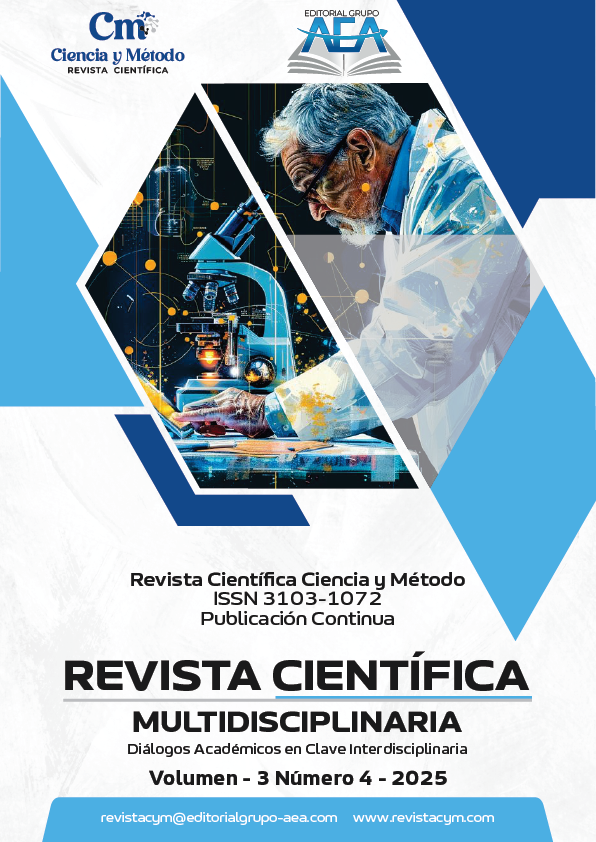Desarrollo de competencias transversales aplicando metodologías activas en estudiantes de pedagogía técnica
Contenido principal del artículo
Resumen
Este estudio revisa críticamente la evidencia reciente sobre el desarrollo de competencias transversales en estudiantes de pedagogía técnica mediante metodologías activas, atendiendo a la brecha entre el discurso competencial y su implementación efectiva. Se realizó una revisión bibliográfica (2015–2025) en bases indexadas, con criterios de elegibilidad predefinidos, cribado independiente por dos revisores (concordancia estimada), extracción estandarizada, valoración de calidad y síntesis narrativa con elementos cuantitativos ligeros. Los hallazgos indican que el aprendizaje basado en proyectos y problemas, el aula invertida y el trabajo en equipos mejoran de forma consistente colaboración, comunicación y autorregulación cuando se diseñan tareas auténticas, se emplean rúbricas con criterios explícitos y se sostiene la retroalimentación. Los efectos sobre pensamiento crítico y resolución de problemas son más contingentes y dependen de la alineación constructiva, la complejidad de las tareas, el andamiaje metacognitivo y la duración de las intervenciones. Se concluye que la coherencia entre resultados de aprendizaje, actividades y evaluación—reforzada por el co-diseño con estudiantes y ecosistemas evaluativos centrados en desempeño—es condición de posibilidad para impactos sostenibles; las rúbricas y evidencias de desempeño deben prevalecer sobre autorreportes para inferencias válidas, mientras que la evaluación programática aporta trazabilidad y decisiones colegiadas más defendibles.
##plugins.themes.bootstrap3.displayStats.downloads##
Detalles del artículo
Sección

Esta obra está bajo una licencia internacional Creative Commons Atribución-NoComercial 4.0.
Cómo citar
Referencias
Arias-Macias, L. E. (2025). Inteligencias múltiples e inclusión educativa, un reto para el profesorado. Revista Científica Zambos, 4(1), 101-113. https://doi.org/10.69484/rcz/v4/n1/79 DOI: https://doi.org/10.69484/rcz/v4/n1/79
Ayala-Chavez, N. E., Ordoñez-Loor, I. I., Marquez-Pazán, M. E., Yucailla-Verdesoto, M. M., & Marquez-Ruiz, S. D. C. (2025). Competencias digitales docentes y su relación con el aprendizaje autónomo en bachillerato. Revista Científica Ciencia Y Método, 3(2), 74-87. https://doi.org/10.55813/gaea/rcym/v3/n2/56 DOI: https://doi.org/10.55813/gaea/rcym/v3/n2/56
Cajamarca-Correa, M. A., Cangas-Cadena, A. L., Sánchez-Simbaña, S. E., & Pérez-Guillermo, A. G. (2024). Nuevas tendencias en el uso de recursos y herramientas de la Tecnología Educativa para la Educación Universitaria . Journal of Economic and Social Science Research, 4(3), 127–150. https://doi.org/10.55813/gaea/jessr/v4/n3/124 DOI: https://doi.org/10.55813/gaea/jessr/v4/n3/124
Campuzano-Vera, S. E., Alcazar-Espinoza, J. A., Alcazar-Campuzano, M. Z., & Alcazar-Campuzano, J. A. (2025). Transformación de hábitos y actitudes ambientales mediante programas formativos integrales. Revista Científica Ciencia Y Método, 3(3), 416-427. https://doi.org/10.55813/gaea/rcym/v3/n3/84 DOI: https://doi.org/10.55813/gaea/rcym/v3/n3/84
Freeman, S., Eddy, S. L., McDonough, M., Smith, M. K., Okoroafor, N., Jordt, H., & Wenderoth, M. P. (2014). Active learning increases student performance in science, engineering, and mathematics. Proceedings of the National Academy of Sciences, 111(23), 8410–8415. https://doi.org/10.1073/pnas.1319030111 DOI: https://doi.org/10.1073/pnas.1319030111
Frontiers in Education. (2022). Systematic review of learning generic skills in higher education—Enhancing and impeding factors. Frontiers in Education, 7, 885917. https://doi.org/10.3389/feduc.2022.885917 DOI: https://doi.org/10.3389/feduc.2022.885917
García-Álvarez, J., Vázquez-Rodríguez, A., Quiroga-Carrillo, A., & Priegue Caamaño, D. (2022). Transversal competencies for employability in university graduates: A systematic review from the employers’ perspective. Education Sciences, 12(3), 204. https://doi.org/10.3390/educsci12030204 DOI: https://doi.org/10.3390/educsci12030204
Granado-Alcón, M. C., Gómez-Baya, D., Herrera-Gutiérrez, E., Vélez-Toral, M., Alonso-Martín, P., & Martínez-Frutos, M. T. (2020). Project-based learning and the acquisition of competencies and knowledge transfer in higher education. Sustainability, 12(23), 10062. https://doi.org/10.3390/su122310062 DOI: https://doi.org/10.3390/su122310062
Guo, P., Saab, N., Post, L. S., & Admiraal, W. (2020). A review of project-based learning in higher education: Student outcomes and measures. International Journal of Educational Research, 102, 101586. https://doi.org/10.1016/j.ijer.2020.101586 DOI: https://doi.org/10.1016/j.ijer.2020.101586
Juniarta, L., Chan, S., Fennessy, H., Singh, J., Rudenko, T., & Wang, W. (2024). Team-based learning in health professions education: An umbrella review. BMC Medical Education, 24, 1131. https://doi.org/10.1186/s12909-024-06147-x DOI: https://doi.org/10.1186/s12909-024-06147-x
Kek, M. Y. C. A., & Huijser, H. (2023). The critical thinking-oriented adaptations of problem-based learning: A systematic review. Frontiers in Education, 8, 1139987. https://doi.org/10.3389/feduc.2023.1139987 DOI: https://doi.org/10.3389/feduc.2023.1139987
Martínez-Clares, P., & González-Morga, N. (2018). Metodologías de enseñanza en la universidad y su relación con el desarrollo de competencias transversales. Cultura y Educación, 30(2), 233–275. https://doi.org/10.1080/11356405.2018.1457610 DOI: https://doi.org/10.1080/11356405.2018.1457610
Martínez-Clares, P., González-Morga, N., Pérez Cusó, F. J., & González-Lorente, C. (2025). Competencias transversales y aula invertida en Educación Superior. Revista Electrónica Interuniversitaria de Formación del Profesorado, 28(1), —. https://doi.org/10.6018/reifop.622951 DOI: https://doi.org/10.6018/reifop.622951
MDPI–Education Sciences. (2018). Transversal competences: Their importance and learning processes by higher education students. Education Sciences, 8(3), 126. https://doi.org/10.3390/educsci8030126 DOI: https://doi.org/10.3390/educsci8030126
Moreira-Alcivar, E. F. (2025). Desarrollo de un modelo de aprendizaje colaborativo para la enseñanza de la historia en Ecuador. Revista Científica Zambos, 4(1), 87-100. https://doi.org/10.69484/rcz/v4/n1/78 DOI: https://doi.org/10.69484/rcz/v4/n1/78
Paguay-Cuvi, J. M. (2025). Relación entre la capacitación profesional técnica y la capacitación pedagógica de los docentes de educación técnica en bachillerato. Revista Científica Zambos, 4(1), 153-165. https://doi.org/10.69484/rcz/v4/n1/83 DOI: https://doi.org/10.69484/rcz/v4/n1/83
Panadero, E., & Jonsson, A. (2013). The use of scoring rubrics for formative assessment purposes revisited: A review. Educational Research Review, 9, 129–144. https://doi.org/10.1016/j.edurev.2013.01.002 DOI: https://doi.org/10.1016/j.edurev.2013.01.002
Piedra-Castro, W. I., Cajamarca-Correa, M. A., Burbano-Buñay, E. S., & Moreira-Alcívar, E. F. (2024). Integración de la inteligencia artificial en la enseñanza de las Ciencias Sociales en la educación superior. Journal of Economic and Social Science Research, 4(3), 105–126. https://doi.org/10.55813/gaea/jessr/v4/n3/123 DOI: https://doi.org/10.55813/gaea/jessr/v4/n3/123
Puyol-Cortez, J. L., & Mina-Bone, S. G. (2022). Explorando el liderazgo de los profesores en la educación superior: un enfoque en la UTELVT Santo Domingo. Journal of Economic and Social Science Research, 2(2), 16–28. https://doi.org/10.55813/gaea/jessr/v2/n2/49 DOI: https://doi.org/10.55813/gaea/jessr/v2/n2/49
Saavedra-Calberto, I. M., Esmeraldas-Espinoza, A. A., Ayala-Chavez, N. E., Reina-Bravo, E. G., & Ordoñez-Loor, I. I. (2025). Factores determinantes del rendimiento académico en estudiantes de bachillerato en instituciones públicas. Revista Científica Ciencia Y Método, 3(1), 72-83. https://doi.org/10.55813/gaea/rcym/v3/n1/54 DOI: https://doi.org/10.55813/gaea/rcym/v3/n1/54
Strelan, P., Osborn, A., & Palmer, E. (2020). The flipped classroom: A meta-analysis of effects on student performance across disciplines and education levels. Educational Research Review, 30, 100314. https://doi.org/10.1016/j.edurev.2020.100314 DOI: https://doi.org/10.1016/j.edurev.2020.100314
van Alten, D. C. D., Phielix, C., Janssen, J., & Kester, L. (2019). Effects of flipping the classroom on learning outcomes and satisfaction: A meta-analysis. Educational Research Review, 28, 100281. https://doi.org/10.1016/j.edurev.2019.05.003 DOI: https://doi.org/10.1016/j.edurev.2019.05.003





